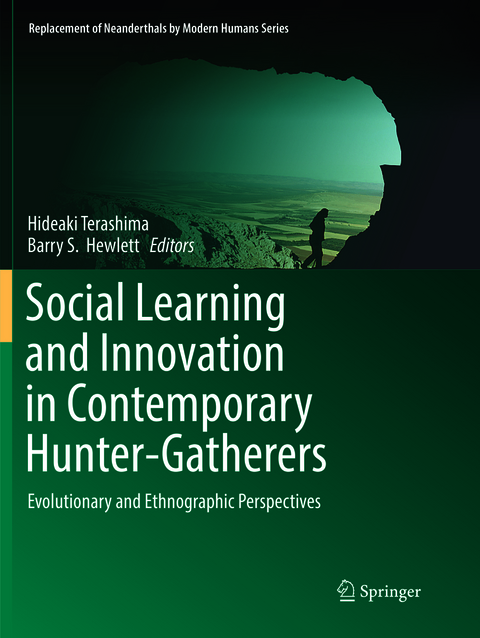
Social Learning and Innovation in Contemporary Hunter-Gatherers
Springer Verlag, Japan
978-4-431-56749-3 (ISBN)
Social Learning and Innovation in Hunter-Gatherers.- A Cross-Cultural Analysis of Hunter-Gatherer Social Learning.- Teaching and Overimiation in Hunter-Gatherers.- A Multi-Stage Learning Model for Cultural Transmission: Evidence from Three Indigenous Societies.- To Share or Not to Share? Social Processes of Learning to Share Food among Hadza Hunter-Gatherer Children.- Learning to Spear Hunt among Ethiopian Chabu Adolescent Hunter-Gatherers.- Transmission of Body Decoration among the Baka Hunter-Gatherers.- Education and Learning During Social Situations among Central Kalahari San.- Constructing Social Learning in Interaction among the Baka Hunter-Gatherers.- Social and Epistemological Dimensions of Learning among Nayaka Hunter-Gatherers.- High Motivation and Low Gain: Food Procurement from Rainforest Foraging by Baka Hunter-Gatherer Children.- Play, Music, and Taboo in Reproduction of an Egalitarian Society.- Children’s Play and the Integration of Social and Individual Learning: A Cultural Niche Construction Perspective.- Evening Play: Acquainting Toddlers with Dangers and Fear and Yuendumu, Northern Territory.- Hunting Play among San Children: Imitation, Learning, and Play.- When Hunters Gather But Do not Hunt; Playing with the State in the Forest: Jarawa Children’s changing World.- Innovation and Social Learning among Chabu Adolescent Hunter-Gatherers of Ethiopia.- Variations in Shape, Local Classification, and the Establishment of a Chaine Operatore for Pot Making among Female Potters in Southwestern Ethiopia.- Innovation of Paintings and its Transmission: Case Studies from Aboriginal Art in Australia.- Early Social Cognitive Development in Baka Infants: Joint Attention, Behavior Control, Understanding of the Self Related to Others, Social Approaching, and Language Learning.- Learning in Collaborative Action Through the Art Works of Baka Hunter-Gatherer Children.- Hunter-Gatherers and Learning Nature.- Socio-Cultural Cultural of Positive Attitudes Towards Learning: Considering Differences in Learning Ability between Neanderthals and Modern Humans from Examining Inuit Children’s Learning Process.- Body Growth and Life History of Modern Humans and Neanderthals from the Perspective of Human Evolution.- Evolutionary Location of the Neanderthal between Chimpanzees and Modern Humans: A Working Memory, Theory of Mind and Brain Developmental, Piagetian Perspective.- Reflections on Hunter-Gatherer Social Learning and Innovation
| Erscheinungsdatum | 27.08.2018 |
|---|---|
| Reihe/Serie | Replacement of Neanderthals by Modern Humans Series |
| Zusatzinfo | 57 Illustrations, color; 22 Illustrations, black and white; XVIII, 318 p. 79 illus., 57 illus. in color. |
| Verlagsort | Tokyo |
| Sprache | englisch |
| Maße | 210 x 279 mm |
| Themenwelt | Geisteswissenschaften ► Archäologie |
| Geisteswissenschaften ► Psychologie ► Allgemeine Psychologie | |
| Geisteswissenschaften ► Psychologie ► Verhaltenstherapie | |
| Sozialwissenschaften ► Ethnologie | |
| Sozialwissenschaften ► Soziologie | |
| ISBN-10 | 4-431-56749-6 / 4431567496 |
| ISBN-13 | 978-4-431-56749-3 / 9784431567493 |
| Zustand | Neuware |
| Haben Sie eine Frage zum Produkt? |
aus dem Bereich


